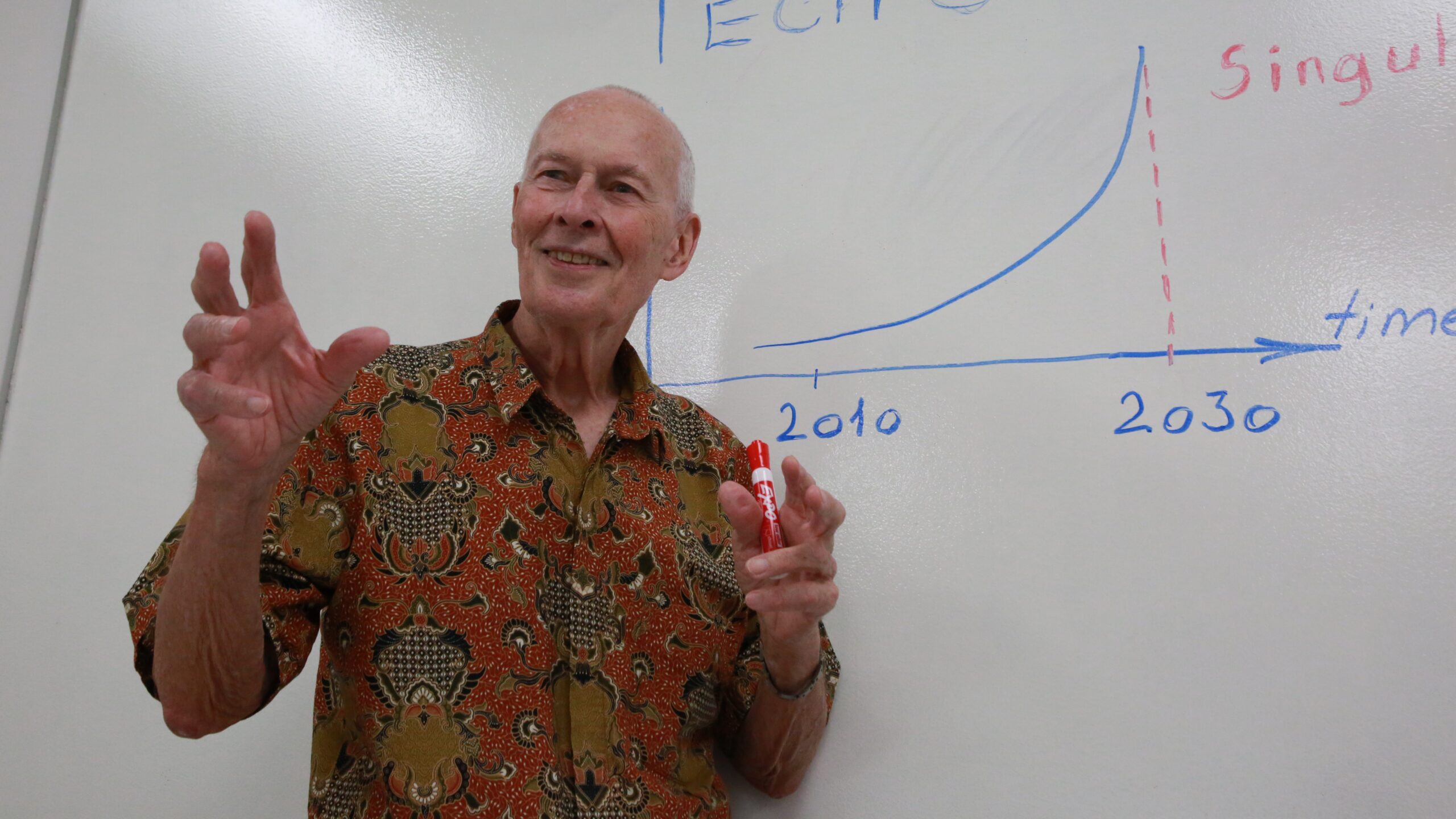A Decade of Discovery

Big Ideas Forum Celebrates 10 Years of Intellectual Exchange
Writer Joseph J. Airdo // Photography by Hugh Halback
In the fall of 2014, two newcomers to Anthem found themselves drawn to the same corner table at the Starbucks on Anthem Way, their conversations invariably turning to the future. Gary Bettis, a retired clinical psychologist, and Torben Riise, a retired biotech executive from Denmark, discovered a shared fascination with emerging technologies that seemed to promise — or threaten — to reshape human existence.
“Two things stood out,” Riise recalls of those early discussions. “First was the concept of singularity — also known as Moore’s Law. We realized that technological development wasn’t just fast; it was accelerating exponentially. Things we might have thought were decades away could become reality in just five to 10 years.”
Their weekly coffee meetings became an exploration of revolutionary concepts: graphene, the newly discovered carbon molecule with properties that could transform construction and engineering; origami techniques being adapted by the space industry to compress large equipment into launch-ready packages; the emerging promise of 3D printing.
“We thought every curious person would be fascinated by these developments and want to understand their implications,” Riise explains.
That conviction led to a simple question: Why not share these conversations with others? Drawing inspiration from Culture in the City, a successful lecture series Riise had participated in while living in Miami, the duo approached the library manager at Boulder Creek High School with their vision for a community forum. She embraced the concept immediately.
On Oct. 1, 2015, 12 people gathered for the inaugural Big Ideas Forum meeting to discuss “Futurism and Singularity.”
“It was a mixture of apprehension and hope,” Bettis remembers. “We had no idea if anyone would be interested. I think we prepared ourselves for the possibility that it might just be the two of us.”
Their concerns proved unfounded. Within months, attendance swelled to 20 to 25 regular participants, with occasional meetings drawing 35 to 40 curious minds. The forum had tapped into something vital: a community hunger for substantive intellectual discourse in an accessible format.
“When we saw more and more people not only attending but also wanting to share their own knowledge and expertise, we knew we had found a good formula that was working,” Riise notes. “Among those early participants was Brant Herbert, who not only became a regular presenter but has since served as the forum’s webmaster, becoming the backbone of its digital presence.”
The breadth of topics tackled over nearly 130 meetings reflects both the founders’ wide-ranging curiosity and their community’s intellectual appetite. Sessions have explored cutting-edge science — epigenetics, brain-computer interfaces, artificial intelligence — alongside social issues such as human trafficking, creativity and the philosophy of contentment. Politics and religion remain deliberately off limits.
Some of the forum’s most memorable moments have emerged from unexpected directions.
“When a finance professor gave a five-minute presentation about the talus bone in the foot and the discussion that followed lasted 40 minutes, we knew people were more than superficially curious,” Riise recalls. “It was similar when a culinary specialist gave us an update on the status of nuclear energy in Arizona as well as when an attorney engaged in a discussion about the nature of time and quantum physics.”
The forum’s signature event, the recurring TechSlam, embodies this spirit of spontaneous intellectual exchange. Participants have five to seven minutes to introduce any topic for discussion — no formal presentation required. The format consistently generates the kind of animated dialogue that extends long after meetings officially end.
In 2020, the forum relocated from the high school library to the Anthem Civic Building, where it continues to meet monthly on the first Thursday at 4:30 p.m. (excluding July and August). The venue change reflected both growing attendance and the forum’s established role as a community institution.
For Riise, whose background includes founding multiple intellectual organizations across two continents, the forum addresses a fundamental need.
“My question was always: Where do you go to get a good, solid introduction to a subject in a short amount of time — without signing up for classes at a formal teaching institution?” he explains. “When we moved to Anthem, I was looking for something that would fulfill that ambition. Since it wasn’t here, Gary and I decided to create it.”
As the Big Ideas Forum approaches its 129th meeting this November, Riise’s hopes for its future remain characteristically thoughtful.
“I hope we’ll be remembered for providing valuable information in a friendly, entertaining format,” he reflects. “My greatest wish is that the forum will continue indefinitely, with people always motivated to develop both the format and the content.”
What began as two strangers bonding over coffee has evolved into Anthem’s most enduring intellectual salon — proof that curiosity, when shared, multiplies exponentially.

